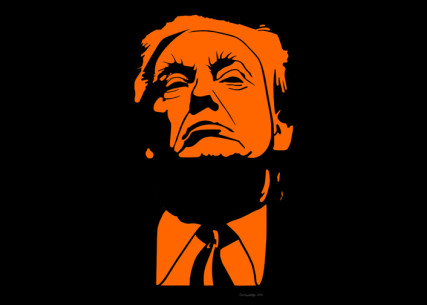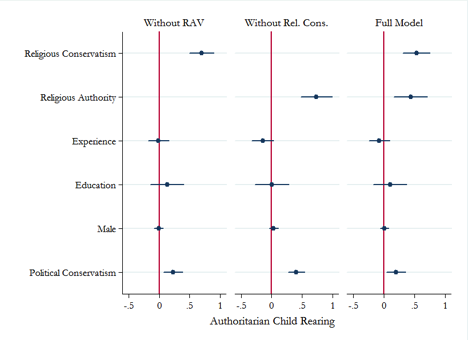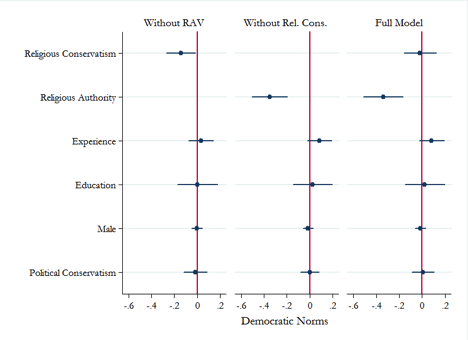
Caricature of Donald Trump by DonkeyHotey via Flickr Creative Commons https://www.flickr.com/photos/donkeyhotey/25485978382/
Guest post by Ryan Burge
Why are so many religious conservatives backing Donald Trump? Trump may not be the model of religious faithfulness and virtue, but he may appeal to those who value leadership and authority.
Political scientists and psychologists are finding that Trump seems to be tapping into an authoritarian personality trait that exists in a large subset of the population. Authoritarians seek strong, powerful leadership and fear many so-called “out groups” (such as racial minorities).
My research finds that people who value strong religious authority also tend to be those who show other signs of being authoritarian. Religious authoritarians are often political authoritarians.
Along with my colleagues Paul Djupe (Dennison University) and Brian Calfano (Missouri State University), I conducted a survey of clergy. To tap into religious authoritarian values, we asked them how much they agreed with a number of statements regarding how religious congregations should be structured and led.
- The more clergy can step out of the way of the congregation the better
- It is important for the congregation to construct their own salvation
- The Gospel is what the congregation makes of it
- I believe there are many valid interpretations of the Bible
- The church must adapt to a postmodern culture in order to spread the Gospel.
Based on responses to these questions, we are able to measure how much clergy value religious authority. In an earlier post I describe how clergy who are more religiously conservative also indicate a stronger belief in religious authority. How does this belief in religious authority shape other types of authoritarianism?
One of the most commonly used authoritarianism is based on how people viewed the goal of child rearing. Do they think it is more important for children to be raised to be obedient or to think for themselves? We gave clergy three pairs of goals and asked them to tell us which one is more important:
- independence or respect for elders,
- curiosity or good manners,
- being considerate or well-behaved
Together, these items give us a scale to see how important authority is compared to independence.
I crunched the numbers and found that clergy who believe in religious authority also prioritize raising children to be obedient and respectful as opposed to independent and curious.
(For details on interpreting the figures, see the geek note at the end of the post)
An additional battery of questions was posed that assessed how committed clergy were to deliberation in their congregation. Clergy either had to agree or disagree with five statements.
- We explicitly encourage participants to think seriously about the views of others
- It would be essential that all those present participate
- It is essential that a range of viewpoints be presented
- It would be essential for participants to learn how our values apply to issues
- It would be essential for participants to learn how to talk through their differences
An interesting result emerges: religious authority matters but religious conservatism doesn’t. In individual models, religious authority and religious conservatism both predict lower levels of deliberative values. However, when both variables are included in a single model religious conservatism no longer is predictive but religious authority makes pastors much less supportive of open debate in their congregations.
A similar set of questions were asked that tried to understand how much clergy support foundational democratic principles. The four statements were:
- It’s very important that politicians air their differences of opinion publicly
- You can’t have democracy without political opposition
- You can’t be sure an opinion is correct unless people are free to argue against it
- Unless many views are presented, there is little chance that the truth can ever be known.
The model for democratic norms looks almost exactly like the one for deliberative values. Taken individually, both religious conservatism and religious authority predict lower levels of support for democratic norms, but modeled together the only variable that remains viable is religious authority. Consider it this way: clergy with the highest level of religious authority are a third less supportive of both democratic norms and deliberative values than clergy with the lowest scores on religious authority.
Many observers have noted that the Trump voters are authoritarians. They seek a strong leader who punishes opposition and speaks with impunity. It seems that this same phenomenon may exist in Christian churches. Clergy who have a strong view of religious authority seem to be less willing to allow for true discussion to occur in their congregations, possibly because it could undermine their authority as spiritual leaders.
Religious authoritarians seemed to be less convinced that democracy functions best when many views can be presented. It’s impossible to know if religion accelerates authoritarianism or has no effect on it, but it seems that a certain subset of Christians seem to believe in and seek out strong leaders like Trump.
Geek Note
The survey was drawn from the Southern Baptist Convention, the United Methodist Church, the Reformed Church in America, the Presbyterian Church (USA), and clergy from the Greek Orthodox Church.
I am displaying the results of regression in visual form. The dot is the average difference between those with the characteristic and those without it.This difference takes into account other factors listed (e.g., education and religious conservatism).So, if the dot for religious authority is to the right of the line, then a person with a strong belief in religious authority has a higher value even after considering all of the factors listed. If both the dot and line don’t intersect with zero there is a statistically valid effect. If the dot is to the right of the vertical line it means that the variable predicts an increase, if it’s below it decreases the effect. I ran a model with just religious authority, one with just religious conservatism and then a combined model while including some control variables.
Ryan Burge @ryanburge researches religion and politics. He is currently studying the politics of the emerging church movement.
Don’t miss any more posts from the Corner of Church & State. Click the red subscribe button in the right hand column. Follow @TobinGrant on Twitter and on the Corner of Church & State Facebook page.






